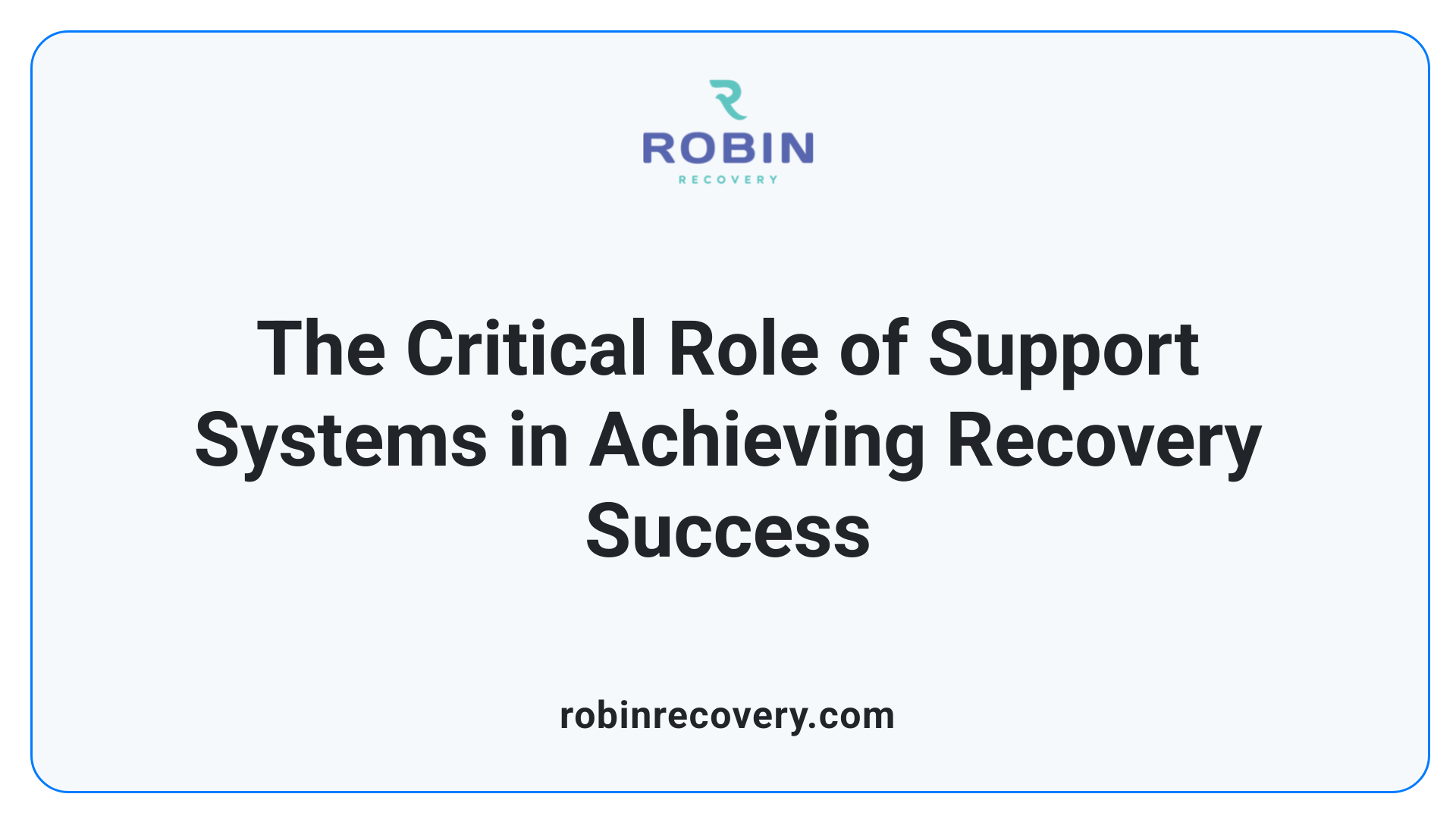How to Stay Connected to Your Support System Post-Rehab

Understanding the Importance of Support in Recovery
Recovery from substance use disorder is a lifelong journey that extends far beyond the walls of a rehab center. A robust support system can significantly enhance the chances of maintaining sobriety, providing emotional strength, practical guidance, and a sense of community. This article explores effective strategies to stay connected to your support network post-rehab, the resources available to aid your ongoing journey, and how family and friends can play a vital role in sustained recovery.
Developing a Personalized Post-Rehab Support Plan

Maintaining long-term recovery after completing a rehab program requires a carefully crafted support plan designed to prevent relapse and promote ongoing well-being. A crucial step involves engaging in continuous treatment options, such as outpatient therapy, medication management, and regular check-ins with healthcare professionals. These resources help address emotional and psychological challenges that may arise long after formal rehab ends.
Participation in support groups like Alcoholics Anonymous (AA), Narcotics Anonymous (NA), or SMART Recovery can provide a vital sense of community. Regular attendance at meetings fosters peer support, shared experiences, and accountability, which are all important for sustaining sobriety.
Monitoring your progress and recognizing early warning signs of relapse are essential parts of a support plan. Techniques such as drug testing, mood tracking, and maintaining open communication with your support network allow for timely interventions. Learning to cope with triggers through stress management practices—like mindfulness, meditation, or yoga—can significantly reduce cravings and emotional upheavals.
Incorporating healthy routines into daily life also plays a big role. Consistent exercise, balanced nutrition, sufficient sleep, and engaging in hobbies not only improve physical health but also reinforce mental resilience. Building a network of trusted friends, family, and community resources helps create a safety net during difficult times.
A personalized relapse prevention plan also involves identifying high-risk situations, developing specific coping strategies, and setting clear, achievable goals. Utilizing services such as SAMHSA’s National Helpline can connect individuals to local treatment providers, community organizations, and additional supports tailored to their needs.
Ultimately, recognizing the signs of emotional, mental, or physical distress and seeking help early are vital steps. Early intervention can prevent a full-blown relapse, ensuring the individual remains focused on the journey of recovery. A well-rounded post-rehab support plan is a powerful tool for long-term sobriety and a healthier, more fulfilling life.
Strategies for Staying Connected with Support Networks
What are some best practices for staying connected to support networks after treatment?
Maintaining a strong support system is vital for long-term recovery. One of the most effective approaches is developing a personalized aftercare plan that combines ongoing therapy, participation in support groups, and utilization of community resources. Regular follow-ups, including virtual check-ins or in-person appointments, help individuals stay accountable and address any emerging challenges.
Active engagement in sober social activities, such as attending 12-step meetings like Alcoholics Anonymous (AA) or Narcotics Anonymous (NA), as well as joining support groups like SMART Recovery, fosters a sense of community and shared purpose. Building relationships with peers and sponsors provides encouragement, guidance, and accountability throughout the recovery journey.
Learning about relapse prevention techniques, managing triggers, and practicing healthy routines like exercise, meditation, or hobbies reinforce sobriety and resilience. Including family and friends by encouraging open communication, setting boundaries, and seeking their support creates a collaborative environment that promotes trust and understanding.
Involving loved ones also involves education about addiction and recovery, which helps them better support their loved ones' needs. Sharing progress and challenges transparently nurtures mutual trust and strengthens the recovery network.
Overall, staying actively involved in sober activities, maintaining regular contact with support networks, and fostering honest communication with loved ones significantly enhance the chances of sustaining sobriety.
The Fundamental Role of a Support System in Recovery Success

Why is having a strong support system important for recovery?
A robust support network plays a vital role in maintaining sobriety after addiction treatment. It offers emotional encouragement, practical help, and crucial social connections that assist individuals in navigating everyday challenges.
Support systems such as family members, friends, peer groups, and community organizations provide comfort and reduce feelings of loneliness and isolation. This sense of belonging is essential for mental well-being and resilience during recovery.
Participation in support groups like Alcoholics Anonymous (AA) or Narcotics Anonymous (NA) further enhances motivation and accountability. Sharing experiences with others who understand the journey fosters hope, reinforces commitment, and promotes long-term abstinence.
Moreover, strong support systems help improve engagement with ongoing treatment. They boost self-confidence and encourage healthier coping strategies, making it easier to manage triggers and reduce the risk of relapse.
The presence of a dependable network can also positively impact mental health by decreasing stress and anxiety levels. This comprehensive social support creates an environment that nurtures recovery, helping individuals build a healthier, more stable life.
In sum, having a supportive community not only fosters emotional stability but also significantly increases the chances of sustained sobriety, demonstrating that recovery is a collective effort rather than a solitary journey.
Supporting Loved Ones During Their Recovery Journey

How can family and friends support someone’s recovery journey after rehab?
Supporting a loved one’s recovery after rehab involves several practical and emotional steps. Family and friends play a fundamental role in creating a healthy environment that encourages sobriety and resilience.
One of the most important ways to support is by staying actively involved and offering consistent encouragement. Celebrating small achievements along the way boosts motivation and reminds the individual of their progress.
Educating yourself about addiction can deepen your understanding of what your loved one is going through. Knowing their specific triggers and needs allows you to provide more tailored support, which is more effective and empathetic.
Participation in family therapy sessions or mutual support groups, such as SMART Recovery Family & Friends, can significantly improve communication and resolve underlying issues that might hinder recovery. These groups offer a platform for expressing concerns, sharing experiences, and learning new ways to support effectively.
It’s also crucial to set healthy boundaries. This includes avoiding enabling behaviors that might undermine their accountability. Supporting independence helps the individual develop confidence in managing their sobriety.
Practicing self-care ensures that you remain strong and capable of providing support. Trusting professionals to guide ongoing treatment and recovery plans balances your involvement with professional oversight.
Overall, a balanced approach that combines emotional support, education, boundaries, and professional guidance contributes to a sustainable recovery process for your loved one.
Resources and Community Support for Long-term Recovery

Post-rehabilitation recovery relies heavily on accessible resources and active community involvement. One of the most important support tools is the SAMHSA National Helpline, which offers free, confidential, 24/7 treatment referrals, helping individuals find local treatment facilities, support groups, and community organizations. Contact can be made via phone at 1-800-662-HELP or through online locators and texts, supporting clients in multiple languages including English and Spanish.
Beyond helplines, various community-based programs such as specialized recovery assessments, case management, relapse prevention, transitional housing, and employment support play a vital role. For example, the Addiction Recovery Program (ARP) in Tennessee provides these tailored services, fostering an environment conducive to sustained sobriety.
Support groups like Alcoholics Anonymous (AA), Narcotics Anonymous (NA), and SMART Recovery serve as peer-led platforms for sharing experiences and coping strategies. Attending these groups regularly can reinforce commitment and prevent relapse.
In addition, alumni programs and sober living houses serve as ongoing transition supports, offering a community of recovering individuals who share similar experiences. Alumni networks organize meetups, promote sober activities, and motivate members through shared success stories.
Building a comprehensive recovery network involves engaging family, friends, professional counselors, and community organizations. Consistent participation in these resources and maintaining open communication create a resilient environment for lasting sobriety.
Participating in local and online support groups, utilizing helpline services, and actively engaging in community programs significantly enhance the likelihood of long-term recovery success. These channels provide ongoing encouragement, accountability, and access to essential services that sustain motivation and facilitate a recovery-oriented lifestyle.
Building and Maintaining a Support System for Long-term Sobriety

How can I build a support network to sustain recovery after rehab?
Creating a reliable support network is essential for maintaining sobriety long after completing rehab. Start by connecting with trusted family members and friends who are understanding of your journey and willing to support your sobriety.
Engaging with peers through support groups such as Alcoholics Anonymous (AA), Narcotics Anonymous (NA), or SMART Recovery offers not only peer encouragement but also shared experiences that can motivate you during tough times. These groups often organize regular meetings, which foster a sense of community and accountability.
Maintaining contact with sponsors or trusted mentors from these groups provides ongoing guidance and support. Regular calls, texts, or participation in online recovery communities help strengthen these bonds and ensure you have a support system readily available.
Rebuilding and forming new sober friendships is also crucial. Engaging in community activities, educational workshops, or alumni events related to recovery broadens your network and instills a sense of purpose.
Additionally, considering sober living environments—residences where individuals support each other's sobriety—can provide a structured, drug-free space that reinforces your commitment.
Seeking professional help through ongoing therapy or counseling, and utilizing community resources such as local recovery centers or health clinics, further solidify your foundation.
Summary of support network building:
Approach Details Benefits Support groups Regular meetings & peer support Accountability & shared experience Professional help Therapists & counselors Emotional stability & coping skills Social connections Family, friends, sober peers Emotional support & motivation Community activities Educational & social events Purpose & sense of belonging Sober living homes Structured environments Environment conducive to sobriety
Developing a diverse mix of connections tailored to your needs creates a strong, ongoing support system. This network can significantly boost your resilience, help manage stress, and prevent relapse, ensuring your long-term recovery success.
Continuous Commitment to Sobriety and Support
Sustaining recovery requires ongoing effort, active participation in support networks, and a commitment to personal growth. By developing a comprehensive aftercare plan, engaging in community and peer support, and involving family and friends, individuals can create a resilient environment that fosters Sobriety. Recognizing triggers, practicing self-care, and utilizing available resources like helplines and community organizations further empower individuals to navigate challenges and maintain their sobriety journey. Recovery is a lifelong process, and building strong, meaningful connections is essential to achieving lasting success.
References
- National Helpline for Mental Health, Drug, Alcohol Issues - SAMHSA
- Comprehensive Post-Rehab Strategies For A Successful Recovery
- Adjusting to life after rehab - Rehabs UK
- Supporting someone through recovery - Alcohol and Drug Foundation
- Building a Healthy Support System in Recovery - Addictions
- How to Stay Sober After Rehab: Building a Support System - Cenikor
- Seven Ways to Show Support to Loved Ones in Rehab - Headwaters
- Living with Your Parents After Rehab: A Guide
